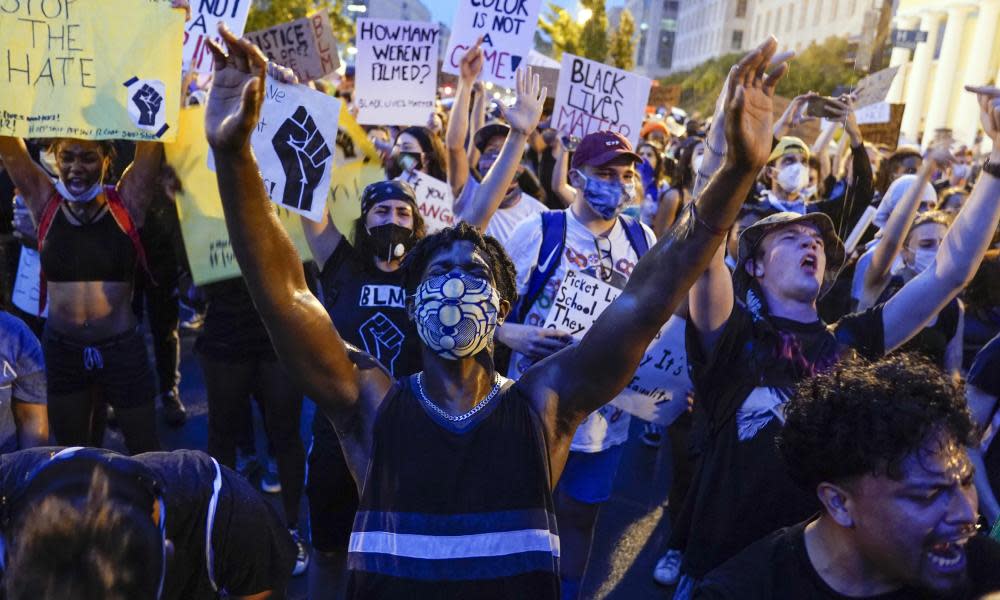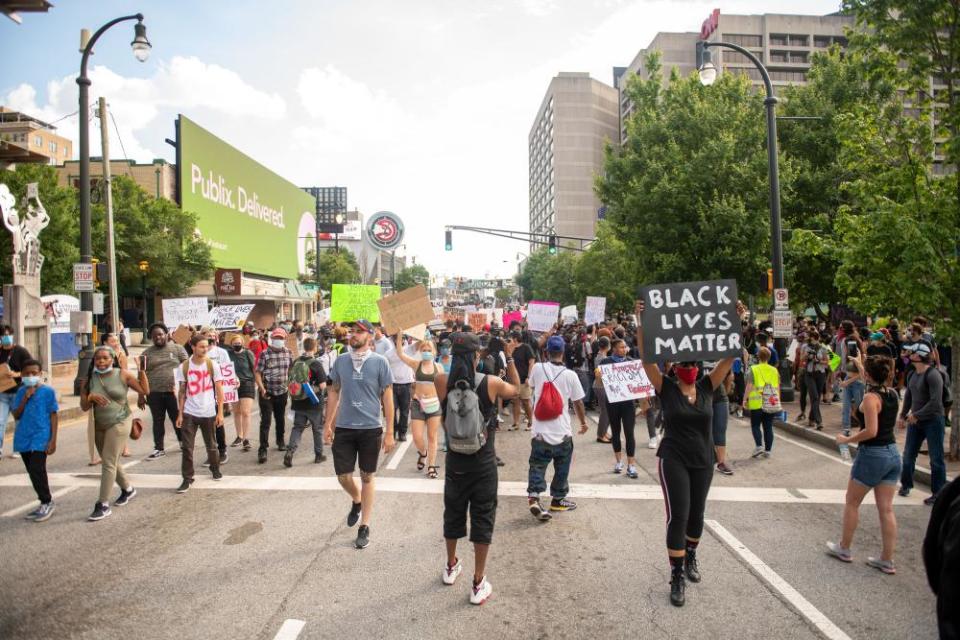'Listen to the oppressed': protesters stay the course as cities ease curfews

Protesters took to the streets once again on Thursday, some under loosened restrictions, as cities from Washington DC to Los Angeles rolled back curfews after days of demonstrations and confrontations with police.
Tensions have eased somewhat in recent days as large, peaceful demonstrations continue across the country, prompting some mayors to ease up on the restrictions aimed at quelling unrest.
In the capital, where law enforcement had forcefully dispersed crowds to make way for Donald Trump’s photo-op in front of a church on Monday, the police presence was reduced as thousands of people marched from the White House to the Lincoln Memorial. Protests broke up before dark Thursday as a heavy rain began to fall.
Related: ACLU suing Trump over assault on peaceful protesters near White House
In New York, thousands gathered and marched across the Brooklyn Bridge, and large crowds gathered in Brooklyn’s Cadman Plaza for a memorial to honor George Floyd, whose death in police custody last week sparked the extraordinary demonstrations against racism and police brutality. His brother Terrence Floyd, wearing a mask and a T-shirt bearing George’s likeness, joined the memorial and thanked those gathered for their support.
“I thank God for you all showing love to my brother,” he said. “Power to the people, all of us.”
A curfew remained in effect for New York City, and the state governor, Andrew Cuomo, warned those taking to the streets are at heightened risk of coronavirus infection.
“If you were at a protest, go get a test, please,” Cuomo said at his daily briefing. “The protesters have a civic duty here also. Be responsible, get a test.”
An estimated 20,000 people have demonstrated in New York City alone, the governor said, adding: “New York City had the highest number of protesters. We have to be smart.”
Law enforcement continue to face scrutiny over their heavy handed tactics in policing demonstrations. In Buffalo, two officers were suspended following video that appeared to show an officer shoving a man to the ground. The city was under an 8pm curfew Thursday night.
Video from WBFO shows the man appearing to hit his head on the pavement, with blood leaking out as officers walk past to clear Niagara Square. Byron Brown, the mayor of Buffalo, said the man is 75 and hospitalized in stable but serious condition. Governor Andrew Cuomo called the incident “wholly unjustified and utterly disgraceful”.

On the country’s west coast, the Los Angeles mayor, Eric Garcetti, announced he would lift the city’s curfew, which had done little to dissuade demonstrators in recent days.
Earlier this week, Garcetti took a knee amid protesters’ chants to defund the police.
The mayor’s announcement came after the LA county sheriff, Alex Villanueva, released a statement saying his department will stop enforcing a curfew.
The decision to lift the curfew came as a lawsuit brought by the ACLU called the measure “draconian” and a violation of first amendment rights.
The ACLU and others have also sued the Trump administration, alleging officials violated the civil rights of protesters who were forcefully removed from a park near the White House ahead of the president’s photo-op.
Curfews were also lifted across the Bay Area, including in San Francisco and Oakland.
The Oakland mayor ended the city’s 8pm curfew on Thursday afternoon after numerous long nights of protesting which at times devolved into looting and vandalism. The looting and has deescalated since the first night of demonstrations, which left much of downtown Oakland in shambles.
Still, curfews ultimately did little to curb those demanding an end to police brutality, who turned out defiantly on Wednesday night in a demonstration that turned into a raucous dance-party.
Crowd dancing to Mac Dre, three hours after #Oakland’s curfew pic.twitter.com/rPpFJUeRxV
— David DeBolt (@daviddebolt) June 4, 2020
In San Francisco a huge demonstration also took place on Wednesday night in defiance of the curfew, with a crowd marching from the Mission neighborhood to City Hall.
Protest events continued Thursday as a memorial service for George Floyd, the first of several, was held in Minneapolis. Family members spoke and the civil rights campaigner Rev Al Sharpton also delivered an impassioned eulogy in which he called on white Americans to “get your knee off our necks”.

He promised a new march on Washington on 28 August, 57 years since Martin Luther King Jr led his march to the capital, to seek policing reform.
In New York, thousands of people who gathered for a memorial event for Floyd in Brooklyn marched north to Williamsburg in the evening, several hours before the 8pm curfew. Many others marched over the Brooklyn Bridge, which connects the borough with Manhattan.
While many protesters had been out for several days, there were also people coming out for the first time in the name of black men and women who have been killed by police.
Felisa, a nurse and activist from Brooklyn, said she and her daughter marched for the first time for the memorial. She passed out voter registration forms and masks.
“I’m here as a parent of the movement,” she said. “I’ve seen gang violence, the crack epidemic, the heroin epidemic – all the things they’ve blamed the black community for.”
Her daughter, 18 and a chemical engineering student, said she had seen five shootings in New York this year, one of which was in her neighborhood this week.
“Even though I’m getting my college education, that won’t save me from an officer wanting to take my life,” she said.
There had been protests for many years but none like this one, she said. “Now see what happens when you don’t listen to the oppressed.”
Agencies contributed reporting

 Yahoo News
Yahoo News 
